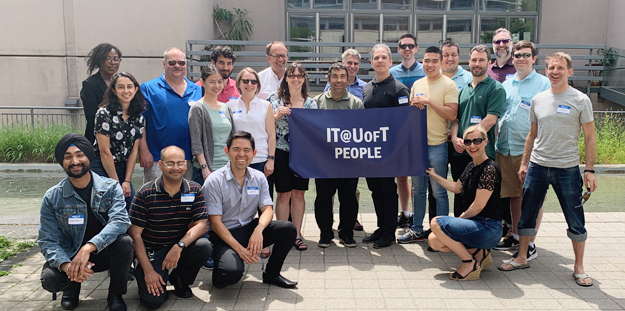The Digital Workplace team joined EASI in October 2019 and since then has continued to make enormous strides in supporting managed workstations and Microsoft Office 365 services across the University. In this Q&A, we speak with Vicki Vokas, manager of the Enterprise Digital Workplace about what services this area provides, current projects and what the future holds.
What is the Digital Workplace?
The Digital Workplace provides the U of T community with efficient support of their standard technology requirements, including:
- Desktop configuration and device management
- Microsoft Office 365, including email support and Office Pro Plus
- Software licensing and deployment
- Security and operating system updates
- Virus and ransomware prevention
- Business solution consultation
- Networking support for clients
- Data storage solutions
Since joining EASI, what have your main projects been?
Office 365 Website Launch (February 28, 2020)
On February 28, we launched new online spaces for U of T’s cloud-based Office 365 service and the Managed Desktop Service. The new Office 365 website offers a comprehensive guide to the wide range of Microsoft applications that are available to U of T staff, students, faculty and alumni. The website launch also includes the migration of the Microsoft Campus and School Agreement site to a new SharePoint site and the migration of existing Office 365 and email tips, tricks and FAQs to the IT Service Centre.
New Online Offboarding Process for IT Accounts (February 27, 2020)
At the beginning of March, the Enterprise Shared Services ServiceNow team launched a streamlined solution that enables managers, business officers and HR staff across the University to submit decommissioning requests for employee IT accounts directly through the Enterprise Service Centre. The employee IT accounts that can now be decommissioned through the ESC include email and access to central enterprise systems such as AMS, ROSI and Quercus.
InTune/Windows 10 Migration (February 2020 to October 2020)
This year, our team will migrate its legacy Managed Desktop Service (MDS) to Microsoft InTune, a cloud-based mobile device management service. During this process, all Windows workstations will also be updated to Windows 10. The migration to InTune and Windows 10 means great things for U of T – it will improve the end-user desktop experience and add enormous value to the University’s workplace modernization initiative. The year-long project is in its pilot stage and will officially launch with a new website detailing the migration process in late March.
Supporting Working Remotely (March 2020 to present)
We have also responded to the recent COVID-19 measures implemented by the University by creating a robust framework of technical resources and client support for staff who are working remotely. The DW team has created online guides for general users and managed desktop clients who need to access technical solutions such as VPNs and Remote Desktop gateway in order to meet the requirements of their jobs. The DW team has also been providing substantial additional technical support to managed desktop clients who need assistance in making the transition to working remotely.
Online Learning – Connect + Learn (March 2020 to present)
The team is participating in a new remote learning series for University of Toronto staff. EASI’s Connect+Learn training initiative will provide University staff members access to collaborative lunchtime learning opportunities on enterprise technologies including OneDrive, Teams, SharePoint, and connecting remotely to core systems such as ROSI and AMS.
Office 365 and High Performance Collaboration Training (March 2020 to present)
EASI is currently collaborating with a training partner, Protiviti, to develop a new set of in-person and online training modules. These modules will help the University’s Office 365 users to derive more value from Microsoft’s powerful suite of applications. Whether a user is new to U of T, new to Office 365, or just wants to learn more about the latest Office 365 productivity enhancements, these modules will help them get up to speed.
Who has joined the team recently and how will their roles help to provide better service?
The following individuals have recently been hired to help with Digital Workplace initiatives. We have a large, collaborative team which helps us to leverage the strengths of each individual and help our clients.
 |
Kathleen McLeod Services Engagement Coordinator Joining us from the ITS Education and Awareness team where she has worked on Information Security initiatives, Kathleen creates new training and outreach programs to ensure more uptake of the Office 365 productivity tools. Her goals are to increase the value end-users derive from the University’s investment in O365 and establish a new model for broadly engaging with our user community. |
 |
Prajwal Channaiah O365 Release Coordinator Before joining the University, Prajwal was a senior engineer at Robert Bosch Engineering and Business Solutions in Germany and India working daily in O365 and Azure (IaaS). In this newly created role, Prajwal is responsible for monitoring major updates to the O365 environment and determining the effects a change will have on the client community. Dissemination, education, and promotion of good practices for using new services and functions is essential for the long-term viability and extraction of benefit from the Office 365 suite. |
 |
Tanya Shattuck O365 Administration and Security Manager Before joining the University, Tanya was a Senior Premier Field Engineer at Microsoft. Her primary role is the stewardship of U of T’s enterprise MS Cloud platform and O365, focusing particularly on its security and risk management. Tanya is the O365 global administrator and technical expert, who is establishing an effective enterprise MS Cloud platform Tier 2 and Tier 3 support operation to manage technical support for U of T help requests and information resources. |
What should EASI and the U of T community know about the Digital Workplace?
EASI’s Digital Workplace team closely collaborates with colleagues across the institution, especially Academic Collaborative Technologies and the Information Commons, to provide University-wide support for services such as email and Office 365 applications. If you’re a Digital Workplace client running your divisional computers on our Managed Desktop Service, we’ll help you find the answer to your information technology issues.
Where do you see the Digital Workplace heading in the future?
In the future, the Digital Workplace hopes to move to a more integrated support structure across the institution – by working with our local IT colleagues we will be able to provide increasingly personalized support.
With InTune, we’ll be expanding the managed desktop environment to including Macs and mobile devices. I want IT to be a fun environment that allows users to embrace a culture of continuous learning and welcomes innovative ways for the University community to use technology in their jobs. After all, our users are the creative geniuses – we just provide the tools.
Thank you to the Digital Workplace team!
Pascal Loucadellis
Jimmy Au
Bobby Carasoulos
Alykhan Halani
Tony Lemmens
Percy Lo
Mike Ryall
Peter Sverko
Natalie Yeung
Shane Baccas
Sheynice Baccas
Irina Belaya
Mari Jang
Leticia Santana
Hariskrishna Venkatesan
Kathleen McLeod
Ian Thomas
Prajwal Channaiah
Derek Liu
Tanya Shattuck
Hong Zhu

